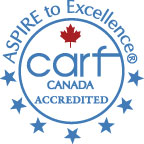Acquired Brain Injury (ABI)
What is an ABI?
An acquired brain injury (ABI) is brain damage that occurs any time after a person is born. There are 2 types of ABI; traumatic and non‐traumatic.
- Traumatic Brain Injury - A traumatic brain injury is the result of a physical force coming from outside of the body such as:
- falls
- bicycle or motor vehicle collisions
- intimate partner/domestic violence
- sports injuries
- assault
- Non‐traumatic Brain Injury - A non‐traumatic brain injury is the result of a problem other than trauma, something that happens inside the body or a substance introduced into the body that causes damage to brain tissue such as:
- an infection, such as meningitis or encephalitis
- blocked or interrupted blood flow to the brain, called a stroke
- a swollen or ruptured blood vessel in the brain, called an aneurysm
- not enough oxygen to the brain, such as in near drowning, or heart attack
- a growth in the brain, called a tumour
- substance misuse
- opioid or other drug overdose
- poisoning
Currently acquired brain injuries impact approximately 1.5 million Canadians, with 160,000 additional people experiencing an ABI every year, and the numbers continue to rise.
WHAT ARE THE EFFECTS OF AN ABI?
How does the brain work?
The brain is the body’s control center. The brain controls our movements, thoughts, feelings, senses (sight, hearing, touch, taste and smell), and communication (what we say or write to others, how we understand what others are saying, how we read).
What happens when the brain is injured?
The effects of brain injuries can be immediately apparent while some may increase/decrease over time. Each individual will experience unique challenges and changes including:
- physical changes
- cognitive changes
- emotional changes
- behavioral changes
In many cases the profound effect on intellectual functioning may not be readily apparent. Cognitive, emotional, speech, and behavioural problems are often prolonged and can affect the individual and family more than the related physical disability. Recovery from brain injury ranges from potentially total dependence, to total independence, depending upon the type and severity of the injury.
The processing of new information may be affected. The brain takes longer to understand messages as they come in; what we see, hear and think, and how we move our limbs and body. Storing new information becomes difficult; the brain has a harder time learning new things. Some information becomes permanently lost; the brain can lose recent or past memories.
Some of the effects of Acquired Brain Injury are:
- memory loss
- sensory impairment
- fatigue
- cognitive difficulties
- feelings of depression and anxiety
- difficulties with social and work relationships
- slurred speech
- confusion
- chronic pain
- seizures
For more information:
Ontario Brain Injury Association: http://obia.ca/
Brain Injury Association of London and Region: http://www.braininjurylondon.on.ca/
Brain Injury Canada: https://www.braininjurycanada.ca/




